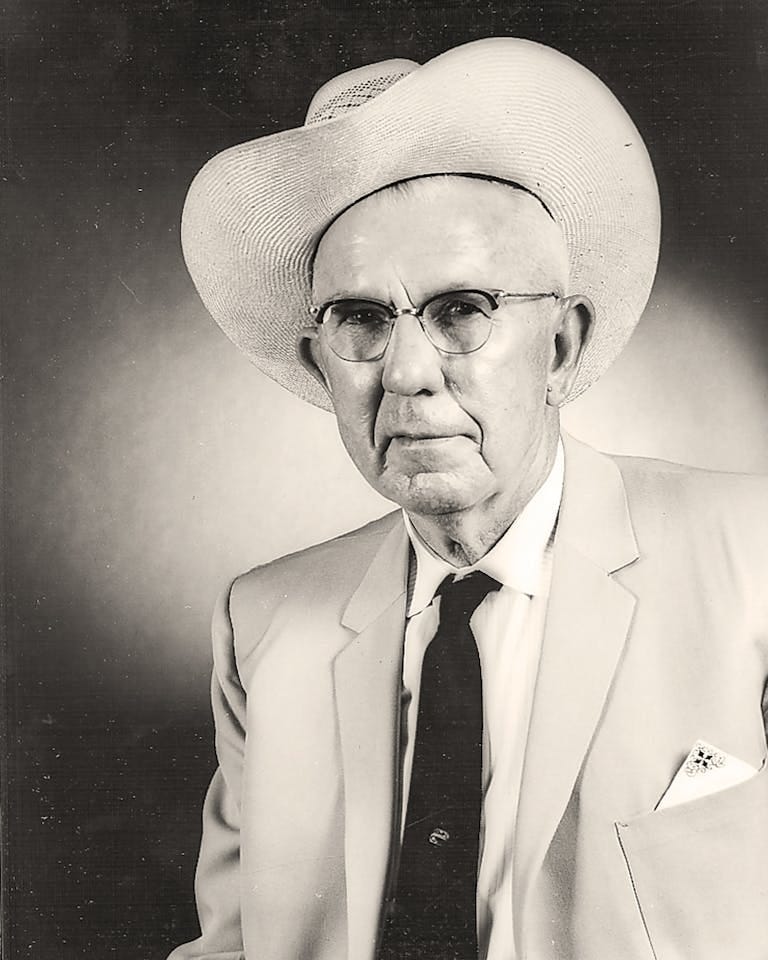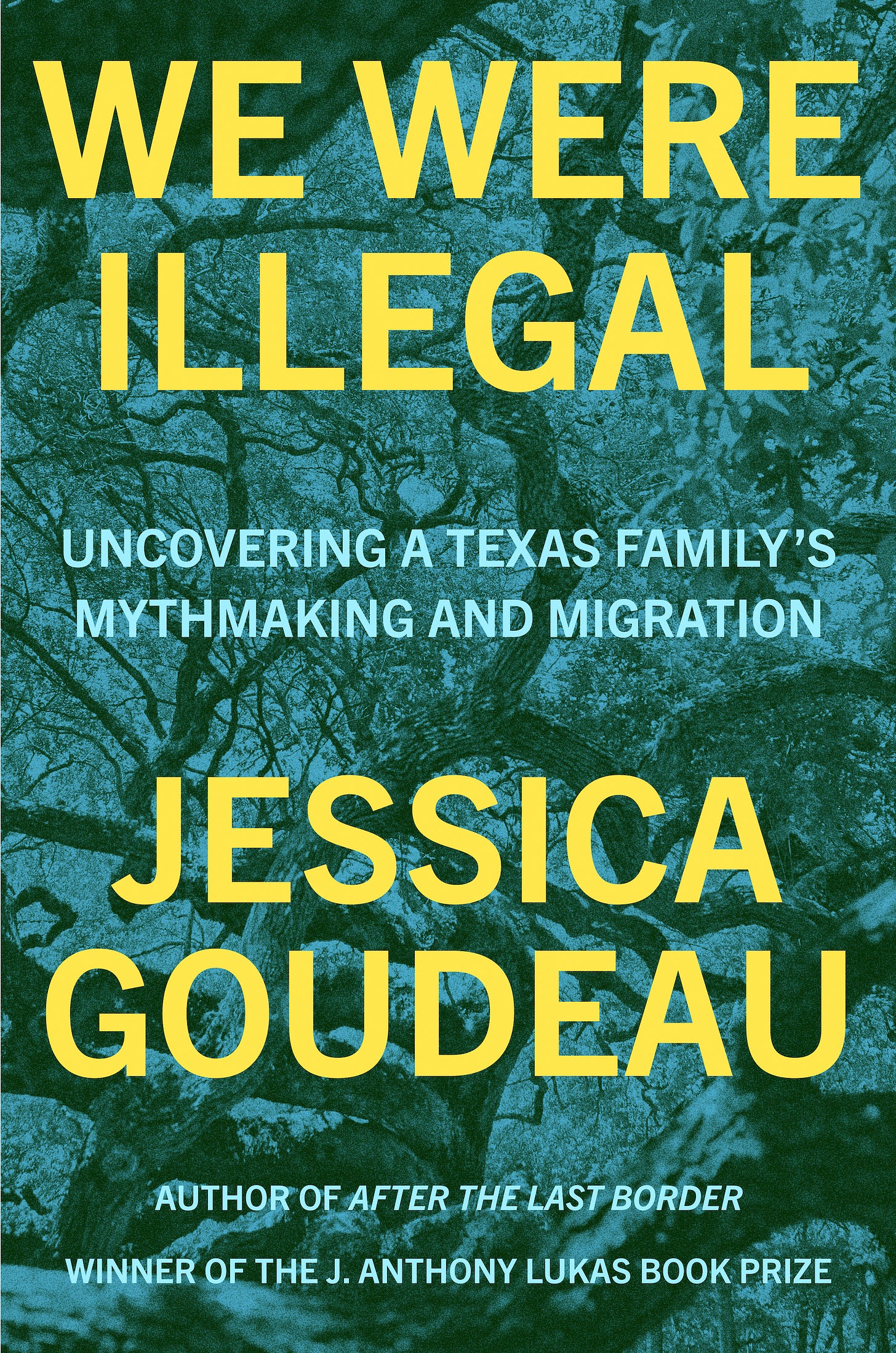Read to Know Basis: Jessica Goudeau
The author of We Were Illegal brings Texas' buried truths to the surface.
Read to Know Basis is a weekly interview series with authors. It features debut authors and established writers talking about reading, writing, and of course snacks. This series is free to all. If you like what you read, consider subscribing to support the work of Unstacked, and of course, go out and buy the book!
Jessica Goudeau is the author of After the Last Border: Two Families and the Story of Refuge in America, winner of the J. Anthony Lukas Book Prize, and We Were Illegal: Uncovering a Texas Family’s Mythmaking and Migration (Viking, June 19, 2024), which was named one of the New York Times “19 Nonfiction Books to Read This Summer” and an Editors’ Choice book. She’s written for the New York Times, The Atlantic, and The Washington Post, among others, and produced short documentaries distributed by Teen Vogue and The New Yorker about young women crossing borders. She holds a PhD in literature from the University of Texas and teaches Creative Nonfiction at Wilkes University. She also co-hosts The Beautiful and Banned podcast with Christine Renee Miller, focusing on banned books, plays, and films.
What are five words to describe your book?
Chosen from my favorite reviews or comments: immersive, well-researched, powerful, thoughtful, and unsparing.
What is the strangest thing you googled while researching/writing this book?
When I began We Were Illegal, I knew I had a great-uncle who’d been a Texas Ranger, so I literally googled: “Frank Probst” “Texas Ranger” and “murder.” The third hit down was a story I’d never heard about how Uncle Frank helped cover up a mass murder committed by a sociopathic sheriff. The story ended up being Part 6 of my book. It explained some critical components of my mother’s family I’d never understood—the trauma, attachment disorders, and abuse that haunted that family line—plus the consequences outside of our family I didn’t know about until I reported on what happened on that farm in July 1945. That Google search eventually led me to interview one of the toddlers present during that mass murder, now a man in his 80s; our conversation was painful and healing to us both.
Describe your ideal reader?
Someone who wants a good story first, who likes history in a novelistic narrative with short chapters, a fast pace, and a personal tone.
What has been the most memorable moment while on your book tour?
Talking with people at bookstores. My first book came out in August 2020 and everything happened on Zoom; I didn’t get to sign any physical books for almost two years. This time, I had standing-room-only crowds at bookstores around Texas as people asked probing questions and shared their own family stories. I know that the people who come to a bookstore to listen to an author are a self-selecting crowd, but those conversations gave me so much hope—outsiders have a view of Texans as ignorant hicks with extreme politics, and instead, I found incredibly engaged people who care deeply about this state and where we’re headed. I’m still thinking about many of those conversations.
What is the one thing you can’t write without?
Beverages! I start with black coffee in the morning, switch to sparkling water around 11:00 am, and keep a cup of water nearby too. I always have at least three drinks on my desk—gotta stay hydrated while I write!
What is a piece of writing advice that you’ve received that you think is really bad? What is a piece of writing advice that you think is really good?
It’s more of a mindset than advice that I find bad: a scarcity mindset is really damaging long-term if you’re a writer. Sometimes I meet other writers who are standoffish or competitive, and I can feel them constantly comparing themselves to others in the room—it seems like an exhausting way to live.
The best writing advice I’ve received, and often pass on, is to know your own writing values and to judge your success by those values. My first two books were about uncovering true stories that are rarely told: first for former refugees, and then for the people who bore the consequences of the migration of families like mine—the people we enslaved or the people whose lands we took. I can’t control the ups and downs of the market or the political season or the public mood, and I have no idea why some books sell well and equally good ones don’t. But I know my values, and I come back to them over and over again; I did what I set out to do and that feels really good. Knowing that makes me more content and more generous with other writers too—we’re all in this wild industry doing our best together!
What are you reading right now? And what book are you desperate to read next?
I’m re-reading I Saw Ramallah by Mourid Barghouti; I cannot wait to start Docile by Hyeseung Song.
What book are you an evangelist for?
I recently reread I Know Why the Caged Bird Sings by Maya Angelou for an episode of the podcast I co-host about banned books, “The Beautiful and Banned,” and I’d forgotten how extraordinary that book is. Angelou’s voice is so clear and biting and engaging and I was mesmerized. We Were Illegal follows information suppression in Texas, and it made me want to understand more about book banning now, which is why we started the podcast; the idea that books like Angelou’s and so many others might be lost to young readers—it’s just crushing. We have to ensure that seminal works like hers, as well as new books or books yet to be published that represent all viewpoints, are available for generations to come.
What is one thing that you think people would be really surprised to know about you?
My next two books are cozy mysteries! After two deeply reported books about displacement, genocide, and systemic injustice, we just sold the first two books (written under the pseudonym Jess Cannon) in a series about a failed English professor who goes home to the fictional town of Blue Oak, Texas to mend her strained relationship with her overly hair-sprayed mother, only to find that her hometown is filled with secrets—and dead bodies. The first book, A Zoom with a View, focuses on the douchebro influencer culture in Austin, including a snark subreddit and the neighborhood Facebook page. The second book, Finnegan’s Not Awake, will be about the sparkling, drama-driven world of Irish Dance. I wake up gleeful every day that I get to write fun books, coming in spring 2026!
Who is your literary crush?
Annette Gordon-Reed; I love her books narratively and historically.
If you could not be a writer what would you do?
Humanitarian aid work in Central or South America.
You’re invited to a literary potluck, what are you bringing?
An appetizer tray of bruschetta topped with goat cheese, fig jam, caramelized pecans, and honey, and a bottle of Devil’s River rye whiskey.
Connect with Jessica: Instagram | Website | TikTok | Threads | Substack








Sold! Ordering up We Were Illegal now.
I'm a sucker for a quirky Texas town, so I'm onboard for the Jess Cannon books, too. Thanks for the introduction, Traci!